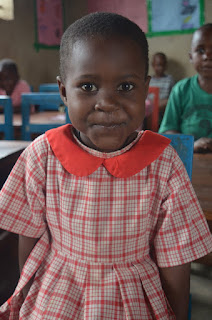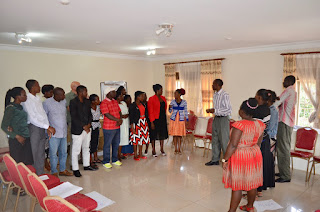Hope is Rising like Steam Off Matooke - Our Visit to St. Paul School
The air smells of steaming green plantains, wrapped up in banana leaves and cooked over an open fire. Matooke will be ready soon. Other than the fire, the terrain is mostly dark, except for the solar-powered lights shining off the top of a sturdy school building. The lights pierce the night, but do not reach far enough to reveal that there are really hundreds of families with tiny, simple homes beneath mango and banana trees in this remote corner of Uganda.
But in the daytime, smiling faces emerge. The quiet coolness of the rainforest is interrupted by the warmth and giggles of young schoolchildren. Concrete floors, swept clean by students with homemade brooms, are soon covered with an endemic layer of red dust. Chickens enter classrooms and are shooed out by children who had earlier removed a dog and a rhinoceros beetle. The teacher inspects student handwriting with a baby on her hip. This is St. Paul School in Nkokonjeru, and our time at St. Paul was more enchanting than any description can provide.
This isn't Disneyland, however. Life is hard here, with most community members making barely enough to survive, let alone pay school fees. But the stunning environment makes people want to stay. With such rich soil and typically good rainfall, people here may make little money as subsistence farmers, but few suffer from malnutrition as they can grow enough to eat.
AIDS is a problem here. Many community members are too scared, ashamed, or uninformed to be tested, often passing off their ailments as "malaria." Even though retroviral drugs are now readily available in east Africa, many still die of AIDS in this region. We conducted scholarship interviews here, as we did in Gulu, and many of our scholarship recipients were students being raised by grandmothers because their parents had died of AIDS.
But life is not bleak at St. Paul. Hope abounds at the school. Three years ago, students were learning on the dirt floor of a shack that most Americans wouldn't find appropriate for a chicken coop. Thanks to many generous donors, the children now are now taught in solid brick and concrete classrooms with desks and chairs. Carrying water from the distant and questionable community water source is virtually a thing of the past as large tanks capture rainwater that is purified for drinking by both the school and community. The solar power system on the roof has brought light to this school, and with the potential help of our colleagues at the nonprofit Kids on Computers, these solar panels will power a modest computer lab in the near future.
The Mwebaza Foundation recently purchased land adjacent to the school lot with the hope of building future teacher homes on it as an incentive to attract qualified teachers to this remote region. And the teachers have planted a generous garden of locally-popular greens such as dodo and nakati, as well as cassava, sweet potatoes, and maize to feed the children. Such a big difference from when we visited two years ago and found the teachers lacking the resources to feed the children lunch!
What made the garden possible when it was not possible two years ago? A van. Through generous grants we received from two different nonprofits, the Mwebaza Foundation purchased a van that the school could use as a taxi to bring in money to pay for school needs. Many families with children at St. Paul School cannot pay or can only pay a portion of their school fees. The school must have additional income in order to meet the needs of its impoverished population. The van has been a huge help in making the school more self-sufficient. With van funds, the school has been able to make building improvements, plant and maintain a large school garden, and feed its students every day.
During our time at St. Paul, the children had a fun and exciting time. They performed modern and traditional dances as part of a celebration with their families where the importance of remaining in school was emphasized. They received letters and t-shirts from their pen pals at Coyote Ridge Elementary in Broomfield, and then wrote their pen pals back to thank them and share a bit about their lives.
But perhaps the biggest excitement of all was receiving new uniforms, paid for mostly by the generous donations of Coyote Ridge families! Uniforms are worn by schoolchildren at nearly every school in Africa. But the families of children at St. Paul cannot afford uniforms, so uniforms have not been required. The students feel so proud to have a uniform like other schoolchildren they see. When someone is dressed nicely in Uganda, people say that they look "smart," meaning "sharp" or "attractive." Don't you agree that the children of St. Paul look "smart" in their new uniforms?
Now we return to Mwebaza School, our original partner school, in time for scholarship interviews and a Parents' Day celebration!














Comments
Post a Comment